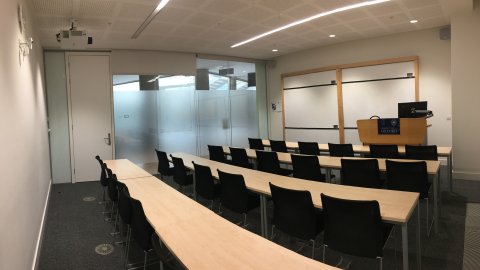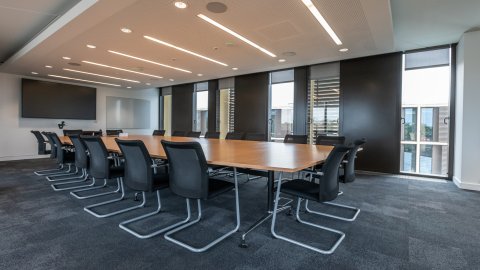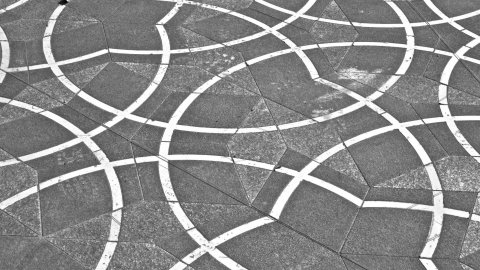16:00
Inverse scattering problems for non-linear wave equations on asymptotically Minkowskian manifolds
Abstract
We present results (joint with Hiroshi isozaki, Matti lassas, and Teemu Tyni) on reconstruction of certain nonlinear wave operators from knowledge of their far field effect on incoming waves. The result depends on the reformulation of the problem as a non-linear Goursat problem in the Penrose conformal compactification, for suitably small incoming waves. The non-linearity is exploited to generate secondary waves, which eventually probe the geometry of the space-time. Some extensions to cosmological space-times will also be discussed. Time permitting, we will contrast these results with near-field inverse scattering obtained for only linear waves, where no non-linearity can be exploited, and the methods depend instead on unique continuation. (The latter joint with Ali Feizmohammadi and Lauri Oksanen).
10:30
Carrollian Fluids in 1+1 Dimensions: Mathematical Theory
Abstract
Due to connections to flat space holography, Carrollian geometry, physics and fluid dynamics have received an explosion of interest over the last two decades. In the Carrollian limit of vanishing speed of light c, relativistic fluids reduce to a set of PDEs called the Carrollian fluid equations. Although in general these equations are not well understood, and their PDE theory does not appear to have been studied, in dimensions 1+1 it turns out that there is a duality with the Galilean compressible Euler equations in 1+1 dimensions inherited from the isomorphism of the Carrollian (c to 0) and Galilean (c to infinity) contractions of the Poincar\'e algebra. Under this duality time and space are interchanged, leading to different dynamics in evolution. I will discuss recent work with N. Athanasiou (Thessaloniki), M. Petropoulos (Paris) and S. Schulz (Pisa) in which we establish the first rigorous PDE results for these equations by introducing a notion of Carrollian isentropy and studying the equations using Lax’s method and compensated compactness. In particular, I will explain that there is global existence in rough norms but finite-time blow-up in smoother norms.
09:15
Carrollian Fluids: Carroll-Galilei Duality
Abstract
Galilean and Carrollian algebras are dual contractions of the Poincaré algebra. They act on two-dimensional Newton--Cartan and Carrollian manifolds and are isomorphic. A consequence of this property is a duality correspondence between one-dimensional Galilean and Carrollian fluids. I will describe the algebras and the dynamics of these systems as they emerge from the relevant limits of Lorentzian hydrodynamics, and explore the advertised duality relationship. This interchanges longitudinal and transverse directions with respect to the flow velocity, and permutes equilibrium and out-of-equilibrium observables, unveiling specific features of Carrollian physics. I will also discuss the hydrodynamic-frame invariance in Lorentzian systems and its fate in the Galilean and Carrollian avatars.
14:30
Flux-balance Laws in Flat Space Holography
Part of a Carrollian day in wonderland 9.15am-5pm.
Abstract
The main challenges in constructing a holographic correspondence for asymptotically flat spacetimes lie in the null nature of the conformal boundary and the non-conservation of gravitational charges in the presence of bulk radiation. In this talk, I shall demonstrate that there exists a systematic and mathematically robust approach to understanding and deriving the associated flux-balance laws from intrinsic boundary geometric considerations — an aspect of crucial importance for flat-space holography, as I shall argue during the presentation.
For self-containment, I shall begin by reviewing key aspects of the geometry at null infinity, which has been termed conformal Carroll geometry. Reviving Ashtekar’s old statement, I shall emphasise that boundary affine connections possess degrees of freedom that precisely serve as the sources encoding radiation from a holographic perspective. I shall conclude by deriving flux-balance laws in an effective field theory framework at the boundary, employing novel techniques that introduce “hypermomenta” as responses to fluctuations in the boundary connection. The strength of our formalism lies in its ability to perform all computations in a manifestly coordinate- and Weyl-invariant manner within the framework of Sir Penrose’s conformal compactification.
12:00
Extreme horizons and Hitchin equations
Abstract





